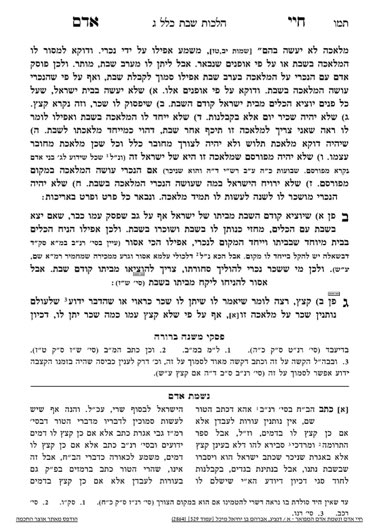We are beginning siman 1. The Chayei Adam begins with another source for the prohibition of amira l’akum. The Chayei Adam writes that it is assur for a Jew to allow a non-Jew to perform work for him on Shabbos. This language implies that there will be scenarios in which the non-Jew offers to do the work and the Jew cannot allow the non-Jew to do it, as we will discuss.
The Chayei Adam writes that Chazal found a pasuk–an asmachta–which appears to support the concept of not allowing a non-Jew to perform melacha for a Jew. The pasuk says kol melacha lo yeiaseh, melacha should not happen [on Shabbos]. The pasuk is written in a passive voice, which Chazal understood as a hint to the issur of amira l’akum.
The concept of asmachta is the idea that Chazal found support for the issur they created from a pasuk. The Pri Megadim, in his introduction to Orach Chaim, writes that there are two types of asmachta, asmachta gemurah and asmachta b’alma. Asmachta gemurah means that there is a very clear hint in the pasuk to the idea, but it is not explicit. Thus, we understand that the Torah was “hinting” to Chazal to create this issur. It is created by Chazal, but grounded in the Torah. Asmachta b’alma means that there is no clear indication in the pasuk that Hashem wished Chazal to create the issur in question. We trust Chazal that they enacted the issur for whatever reason they felt it was necessary. Once it was enacted, they found some way to connect their issur to a pasuk in the Torah.
The assumption of most meforshim is that the asmachta brought by the Chayei Adam is not an asmachta gemurah, but only an asmachta b’alma. Even though the pasuk strongly seems to indicate this idea, there are other reasons the Torah wrote the pasuk in this manner.
The Tur brings this pasuk, and the Beis Yosef writes that there are some opinions that this pasuk makes amira l’akum an issur deoraysa. The Chayei Adam specifically writes that this pasuk is an asmachta because we hold that amira l’akum is an issur derabanan, not deoraysa.
The Chayei Adam continues, and writes that giving a directive on Shabbos is a problem (as we discussed). Additionally, giving a directive to a non-Jew before Shabbos will also be prohibited in certain situations, but there will be situations in which it is permitted, depending on other criteria. He continues and adds that one can make an arrangement with a non-Jew to perform work on Shabbos, even if he does it on Shabbos, provided they meet eight criteria. We will discuss these criteria in the upcoming shiurim, be’ezras Hashem.
Summary
Another source for the issur of amira l’akum is the asmachta kol melacha lo yeiaseh, but it is only an asmachta b’alma.
The Chayei Adam writes that we hold amira l’akum is an issur derabanan.
There will be situations in which one can give a non-Jew work before Shabbos, even if they perform the work on Shabbos. There are eight criteria one must meet in order for it to be permitted.



